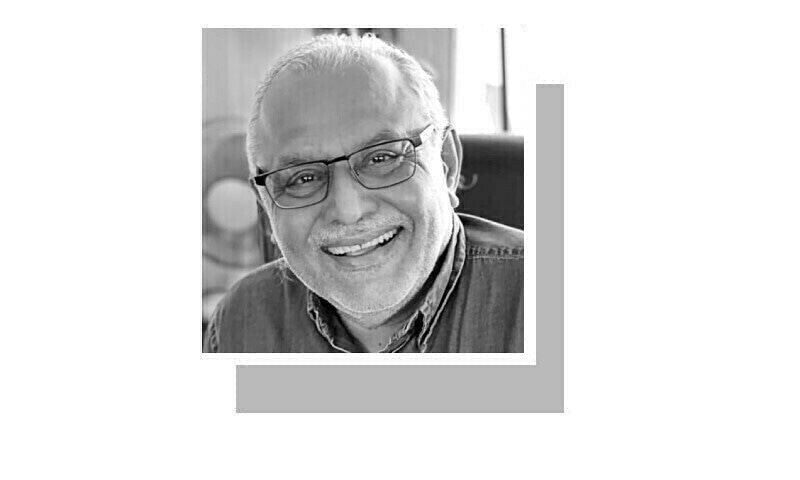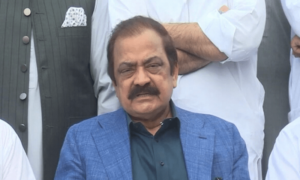IF anyone thought that with the notification of Qazi Faez Isa’s retirement as chief justice of Pakistan in less than two weeks, a line would be drawn under the raging controversy over the establishment-backed government’s plan to push through a constitutional amendment to tame the judiciary, it was not to be.
‘Why?’ would be the obvious question popping in your mind, like it did in mine. The answer is quite simple. In the land of the pure, things are rarely as straightforward as they appear. It is being said that the government and its powerful backers, with coercive tools at their disposal, haven’t really given up. This despite the rather humiliating retreat just last month when they tried but failed to muster the requisite two-thirds support in each House. From the government’s perspective, the ‘do or die deadline’ is Oct 25 — which will be the incumbent chief justice’s last day in office.
Justice Mansoor Ali Shah is scheduled to take oath of office as chief justice of Pakistan the following day, ie Oct 26. The whole rush to have the amendment passed by hook or by crook is to ensure that by the time the honourable Justice Shah, also known by his acronym ‘SMASH’, enters office he doesn’t have the power/ authority to smash the current hybrid system.
As is clear, the whole move is based on assumptions. I, for one, feel these fears are grossly exaggerated. Justice Mansoor Ali Shah is an eminent jurist who has demonstrated he can decide cases as per the dictates of the Constitution and the law.
It is being said that the government and its powerful backers haven’t really given up.
Unlike PPP leader’s Bilawal Bhutto-Zardari’s on-camera assessment that Justice Shah would struggle to ‘control’ other judge/ judges who are perceived to be assertive or hostile towards the government, lawyers I talked to referred to his track record.
They are firm in their view that he is not someone who can be persuaded by this person or that to abandon the strictly constitutional/ legal path, and that speculation to the contrary is no more than that: speculation amounting to uninformed kite-flying.
Bizarrely, some TV/ YouTube personalities on either side of the political divide (I am a bit reluctant to call them journalists, given their blatant bias one way or the other) in their media appearances/ reports have painted identical scenarios under the new chief justice.
Some of these analysts are saying that the February election would be annulled outright, while others are sounding the death knell — in the order of death by a thousand cuts — via accelerated proceedings of the election tribunals.
Depending on your point of reference, these are two of the worst- or best-case scenarios but neither takes into account one small detail: any verdict will need to be implemented by the executive. In our experience, superior judiciary judgments against an incumbent executive have only been implemented if the establishment has endorsed them.
In the unlikely event that any such order is passed, it isn’t clear how it will be implemented. There is no denying that anything remotely like that will take away any semblance of legitimacy from the incumbent rulers and plunge the country into yet another crisis. But this is realpolitik and it remains to be seen how such an improbable move will manifest itself.
Despite legitimate PTI grievances and consequent protests by the party, the past few months have seen the economy stabilise somewhat, with the most critical indicator for the masses, inflation, coming down. This must be seen as a positive, in spite of painfully high utility bills.
This possibly is the other reason why the forces of status quo, including the governing politicians and their uniformed backers, don’t want any upheaval that may rock the boat as it would be very damaging for the economy. They feel if the economy gets going, it might revive their fortunes.
What they would ideally like is a compliant judiciary that facilitates denial of political rights of the legitimate claimants in some cases and economic rights in others, by either looking the other way or by being directly complicit in blunting any legal challenges to the status quo.
This must be their rationale for again trying to have the amendment passed, even when the fear of failure reflects in their thinking and tentative words. What they aren’t prepared to do — at this stage at least — is to question some of their assumptions about what the change in leadership at the Supreme Court will mean.
If at all, their fresh attempt to muster the necessary numbers by winning over Maulana Fazlur Rehman to their side by watering down some provisions of the amendment succeeds, then one can assume some of the powers of the Supreme Court will be transferred to the new federal constitutional court (FCC) to be named entirely by the executive.
In such an event, who knows if the retiring chief justice is asked to take over as head of the FCC or a new appointment is made to that forum’s apex position. The names of the other four (or whatever the finally agreed number) members of the FCC may also tell more about the motivation for the move. For now, all I can say for sure is who will not be on it!
If the National Assembly and Senate sessions are summoned for a date ahead of Oct 25 possibly soon after the SCO meet ends on Oct 16, then it would be safe to assume that those at the helm have the numbers they need.
If not, they’ll be where they are today — mired in uncertainty and unsure of their fate in the coming days, weeks and the challenges they will have to face if the change at the head of the Supreme Court translates into life-altering changes for them as they fear.
The writer is a former editor of Dawn.
abbas.nasir@hotmail.com
Published in Dawn, October 13th, 2024





